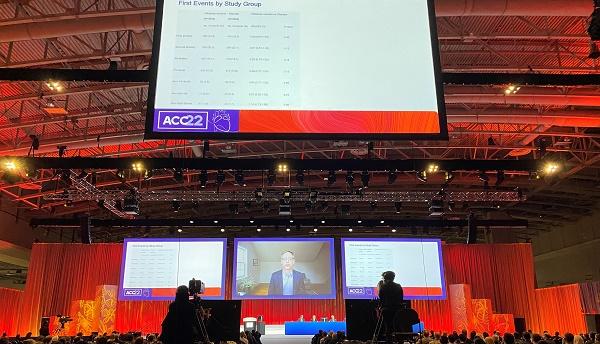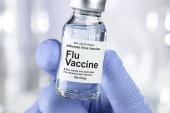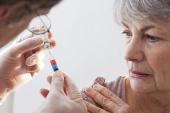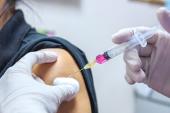Seasonal, but No Year-round Help for HF With Flu Shots: IVVE
Still, reductions in pneumonia and HF hospitalization during peak flu season reinforce the importance of vaccination.

WASHINGTON, DC—(UPDATED) An annual flu shot in patients with heart failure lowers the risk for pneumonia and hospitalization year-round but does not appear to significantly reduce MACE outside of peak flu season compared with a placebo, according to results from the IVVE trial.

While the trial did not meet its primary endpoint, Mark Loeb, MD (McMaster University, Hamilton, Canada), who presented the results today at the American College of Cardiology (ACC) 2022 Scientific Session, told TCTMD the findings should still bolster vaccination efforts especially among higher-risk individuals in lower-income countries.
“Taken in conjunction with the previous trials and the observational studies, our findings suggest that there is definite benefit in . . . vaccinating patients with heart failure with the flu vaccine, which is of relatively low cost,” he said. “[It] should be considered for all countries worldwide.”
IVVE is the first randomized trial to look at the flu shot versus placebo in heart failure patients, according to Loeb, but both the IAMI and INVESTED studies have looked at the cardiovascular effect of flu shots in post-MI patients, with only the former trial showing significant benefits.
Taken in conjunction with the previous trials and the observational studies, our findings suggest that there is definite benefit in . . . vaccinating patients with heart failure with the flu vaccine Mark Loeb
Commenting on the results for TCTMD, Jacob Udell, MD, MPH (University of Toronto, Canada), who served as co-PI of the INVESTED study, said he is not surprised that flu shots didn’t reduce MACE in this population. “I think that's probably because there's more competing risk of CV death from a heart failure pathobiology mechanism that wouldn’t necessarily be modifiable from a flu shot,” Udell explained.
Still, the findings show that vaccination for flu “does its job in general,” he said, and this is particularly important during the pandemic era when the public has become more “circumspective” of vaccines.
“I think it's important to demonstrate that there's an evidence base for flu vaccines,” Udell said. “Right now, it's very trendy to be thinking about vaccinations, but we're in the middle of the pandemic. In a few years from now, . . . when we all go back to living our normal lives, we should remember that preventative care is really important.”
Primary Endpoints Not Met
For the study, Loeb and colleagues enrolled 5,129 patients with heart failure in 10 countries without robust flu vaccination programs. These individuals did not typically receive flu shots and had not reported being vaccinated for flu in the prior 3 years. Participants were randomized to receive the flu shot or a placebo annually for 3 years.
Over follow-up, the composite primary endpoint (cardiovascular death, non-fatal MI, or nonfatal stroke) and co-primary endpoint (cardiovascular death, nonfatal MI, nonfatal stroke, or hospitalization for heart failure) were reported in 691 and 1,470 patients, respectively, with no difference in events year-round between those who received the flu vaccine or placebo. However, rates of pneumonia and hospitalizations were 42% and 15% lower, respectively, in the flu shot group.
Overall Outcomes at 3 Years
|
|
Influenza Vaccine |
Placebo |
HR (95% CI) |
|
|
(n = 2,560) |
(n = 2,569) |
|
|
CV Death, Nonfatal MI, Nonfatal stroke |
14.8% |
16.0% |
0.93 (0.81-1.07) |
|
CV Death, Nonfatal MI, Nonfatal Stroke, |
20.3% |
22.1% |
0.91 (0.81-1.03) |
|
All Death |
16.7% |
18.4% |
0.90 (0.79-1.03) |
|
CV Death |
13.0% |
14.6% |
0.89 (0.77-1.04) |
|
All Hospitalization |
15.1% |
17.6% |
0.85 (0.74-0.97) |
|
HF Hospitalization |
9.4% |
10.7% |
0.88 (0.74-1.04) |
|
Pneumonia |
2.4% |
4.0% |
0.58 (0.42-0.80) |
Also, when the analysis was limited to peak flu season, the flu vaccine group saw a significant drop in the first primary endpoint (7.7% vs 9.4%; HR 0.82; 95% CI 0.68-0.99) as well as reductions in all-cause (8.4% vs 10.6%; HR 0.79; 95% CI 0.66-0.95) and CV death (6.7% vs 8.7%; HR 0.77; 95% CI 0.63-0.94) compared with placebo.
In a few years from now, . . . when we all go back to living our normal lives, we should remember that preventative care is really important. Jacob Udell
“The totality of the evidence actually would strongly support influenza vaccination,” Loeb argued, explaining that when deliberating about what should be the primary outcome of this study, “we thought that if we looked only at the flu seasons, there could have been fewer events or . . . some uncertainty about circulation of influenza. We thought it best to choose the whole thing inside and outside of flu season. But importantly, flu vaccines do not work when flu does not circulate.”
However, he said, “in retrospect . . . knowing the results, we should’ve turned things around and made the co-primary outcomes targeted only in peak influenza season.”
Commenting on the findings during a press briefing, Craig Beavers, PharmD (University of Kentucky, Lexington), called the trial “still positive 100%,” because “anytime you can really prevent a heart failure patient coming into the hospital has so many benefits for a variety of reasons.” For example, he said, guideline-directed medical therapy “can go awry in those transitions, so anything we can do to really stack patients in favor—and this is a clearly easy and effective means of providing a good, solid public health measure that would still be in line with other disease states and other entities. It’s strong work, and it provides a layer of additional detail around flu vaccine in cardiovascular patients.”
Udell said he was surprised to see a trial of flu vaccine with a placebo control pass ethical approval, as “I, personally, could not have done it.” When designing the INVESTED study, “we couldn't find it to be ethical and we didn't believe there was equipoise of not providing influenza vaccine to patients,” Udell said.
In response, Loeb said they “followed WHO criteria on use of placebos for vaccine trials in low and middle income countries,” in that they enrolled patients at sites that don’t normally receive flu vaccines and allowed participants to get vaccinated outside of the trial. “Also, use of an active comparator, like the high-dose vaccine, was not possible because it was not licensed at low- and middle income trial sites. The trial was responsive to local public needs.”
Still, with this study now complete, “during a pandemic nonetheless,” Udell said it was “profound” to see a study for a heart failure intervention.
If the study had included an endpoint of CV death and heart failure hospitalization, “that sort of composite endpoint may have been significant or could have been powered for significance,” Udell said. “But, we'll have to wait for another trial to see that.”
What About COVID?
As for how the COVID-19 pandemic may have affected the results of IVVE, Loeb said while the study completed enrollment before 2020, follow-up continued through November 2021. Some sites thus had trouble receiving vaccine shipments and were not able to continue with the study, though the results were similar when analyzed up to March 2020. “It could be that most of the events had already taken place, and most of the follow-up had happened, but when we looked at the data there wasn’t a major difference,” he said.
Another intriguing avenue of study will be to now look at the effect of COVID vaccines in heart failure patients, Udell said. While COVID vaccines reduce pneumonia and hospitalizations in general, the effect on heart failure hospitalizations is unclear and the existing data are “confounded,” he explained. “I think it's interesting and provocative to ask the question of whether flu vaccines could reduce heart failure hospitalizations and CV death in a heart failure patient population, but our underlying theory remains that this may be more of an antithrombotic protective effect. And it just underscores then that potentially this isn't the population you're going to see that effect in. But I don't think that those are mutually exclusive hypotheses.”
How to do a study like this remains controversial, especially with COVID poised to become a seasonal virus, he said. “Is it ethical still to do, and if it is, how would you do it? Would you do more COVID vaccine versus less? Is there really anyone out there that isn't vaccinated anymore?”
Yael L. Maxwell is Senior Medical Journalist for TCTMD and Section Editor of TCTMD's Fellows Forum. She served as the inaugural…
Read Full BioSources
Loeb M. A randomized controlled trial of influenza vaccine to prevent adverse vascular events (IVVE). Presented at: ACC 2022. April 3, 2022. Washington, DC.





Comments